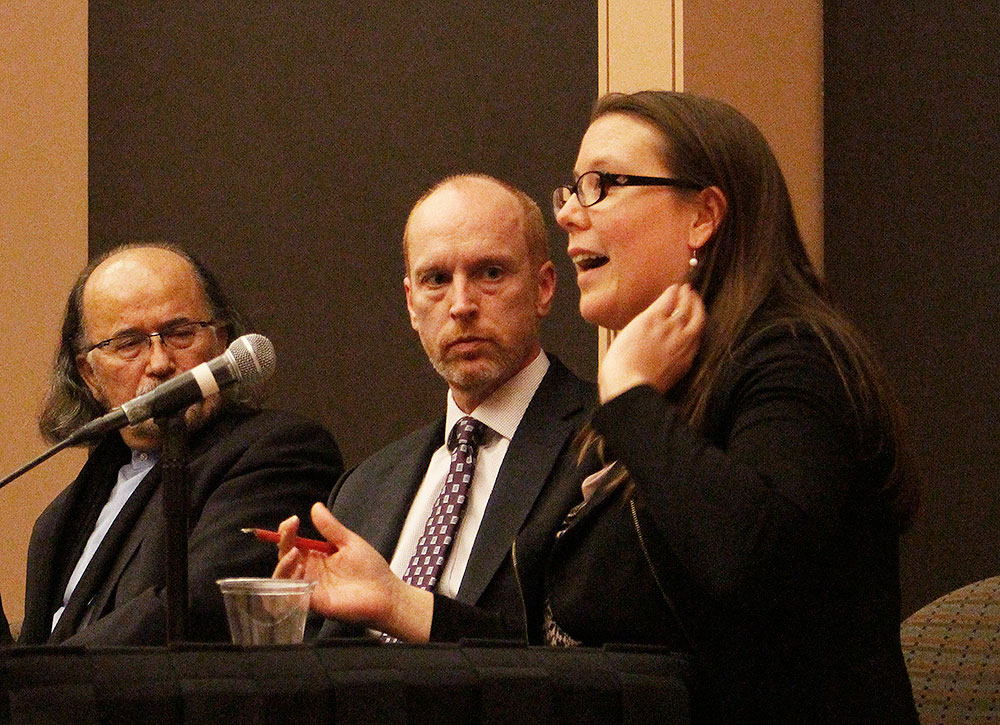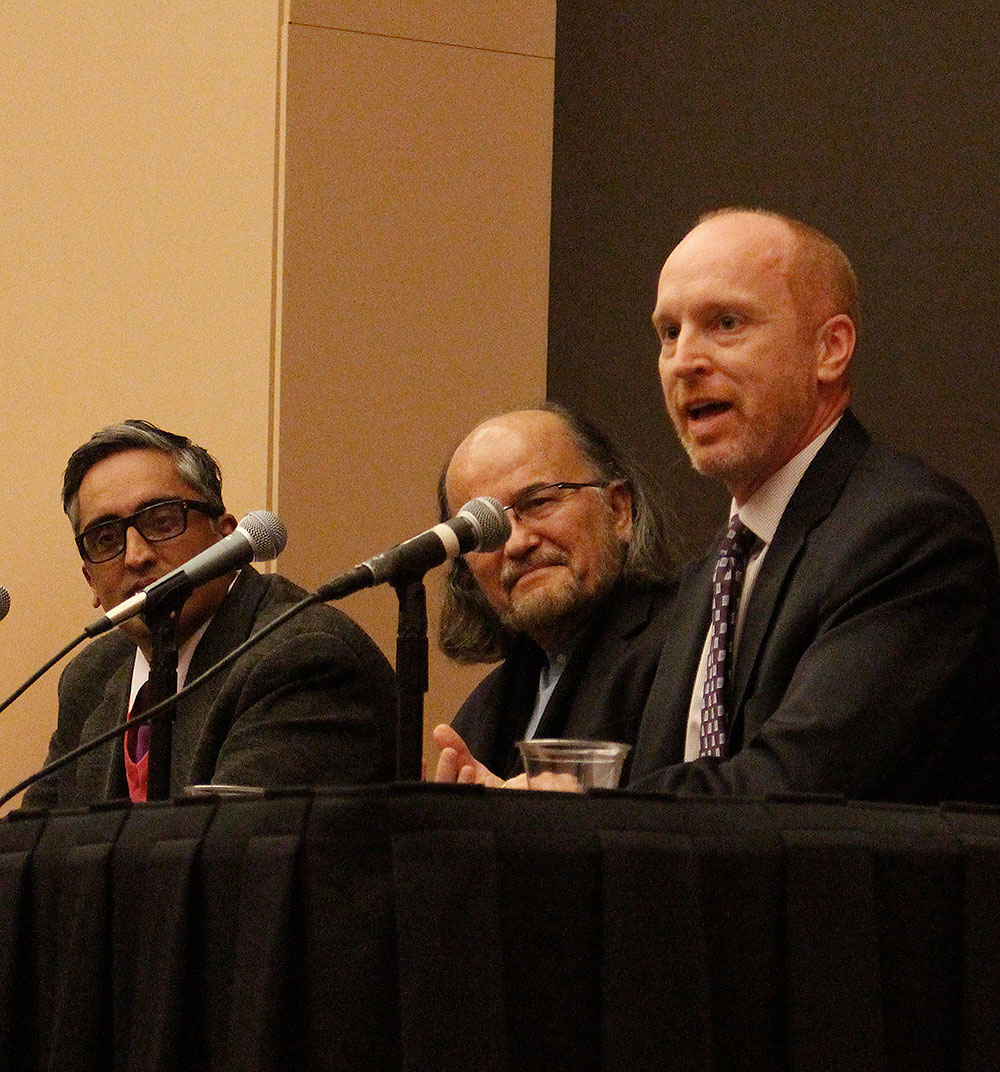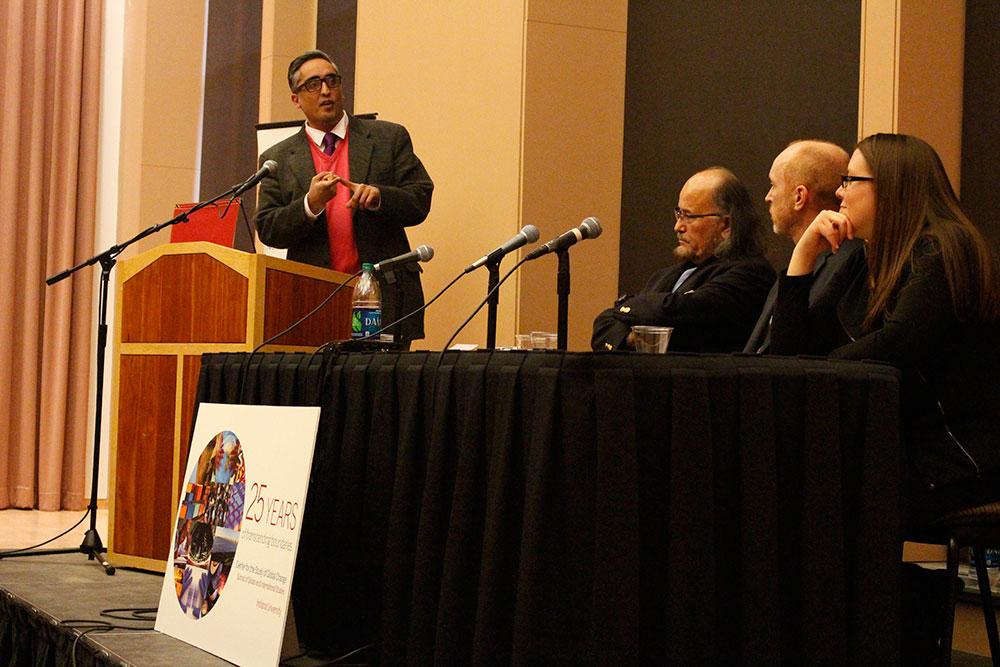Panelists discuss media representation of Muslims

A packed audience at the Neal-Marshall Black Culture Center listened and posed questions to a panel of experts who said deteriorating attitudes toward Muslims in the mass media are unlikely to improve in the near future.
“Covering Islam: 2015: Muslim, Politics and the Media,” was hosted Feb. 9 by the IU Center for the Study of Global Change and co-sponsored by the School of Global and International Studies and The Media School, among others.
Among the four panelists was Arsalan Iftikhar, an international human rights lawyer and author of Islamic Pacifism: Global Muslims in the Post-Osama Era. He opened the panel with a question to the audience.
“How many of you, in one way or another, have heard someone call Barack Hussein Obama a Muslim?” Iftikhar said.
Everyone in the audience raised their hand.
“How many of you have heard that Barack Obama wants to bring Sharia Law to the United States?” he later continued, referring to Islamic law derived from the Qur’an, the holy book of Islam.
A majority of hands shot up. Ithikhar said that the media shares the blame in sensationalizing untruths, but that’s not entirely the point.
“No one said, ‘He’s not a Muslim, but so what if he was?’” Ithikhar said.
Iftikhar said that accusing President Obama of being a Muslim is a way calling him black that’s socially acceptable.
“It’s a way to ‘otherize’ him,” Iftikhar said. He means that, by calling President Obama a Muslim, his critics isolate him from what they consider to be truly American. Iftikar said all Muslims, or anyone who simply “looks Arab,” suffers from this stereotype in American culture. He said this stereotyping has been bad since 9/11, but it’s gotten worse since the Charlie Hebdo attacks in Paris.
“That was a game changer,” Iftikhar said.
He said the shootings of cartoonists at the magazine solidified views in Europe and the United States that Islam is a violent religion plagued by extremists. He said that’s not only untrue, but that it’s also unfair.

“Anders Breivik in Norway killed 77 teenagers on an island, tried to assassinate the prime minister of Norway and left behind a 1,500-page treatise calling himself a soldier of Christianity,” Iftikhar said. “And not one Christian leader was ever required to come on national television to distance themselves from the action of this lunatic.”
In the wake of the Charlie Hebdo attacks, Iftikhar appeared on CNN, where anchor Don Lemon asked Iftikhar if he supported ISIS, after Iftikhar “in no uncertain terms” condemned the attacks as crimes against humanity.
A Pew Research study released last year reported that Muslims are the least-liked religious group in the United States.
Panelist Nazif Shahrani, a professor of anthropology at IU’s Near Eastern Languages and Cultures and Central Eurasian Studies, said that negative portrayals of Muslims shouldn’t be socially acceptable.
“You can’t say these things to Asians, to Latinos, to Blacks, to Christians, to Buddhists, that you say to Muslims,” Nazif Shahrani said. “As long as the position of approaching Muslims as an enemy, a threat continues, without anything changing, there’s no chance of getting better.”
Shahrani said that lumping Muslims into one category of people, despite the fact they number 1.2 billion and live in a variety of countries, and accusing them of complicity in violent acts alienates many, which motivates them to radicalize and join groups like ISIS.
“ISIS didn’t come out of thin air,” Shahrani said. “We created ISIS. We have been cobbling together these types of organizations, and it will only get worse if we don’t change.”
Panelist Matthew Tully, a columnist for The Indianapolis Star, agreed, and he said that change should happen at a grassroots level in local community and media.
“All politics are local,” Tully said. “When it comes to civil rights, it’s all local.”
Tully, BA’92, has 23 years of journalism experience and was invited to speak because he recently covered André Carson’s (D-Ind., 7th District) appointment to the House Intelligence Committee. Carson is the one of two Muslims serving in the legislative branch, the first in U.S. history.
“I try to write in a way that challenges people with fixed ideas to show them the reality of what’s going on,” Tully said. “I want to make it a little harder to hate people that are good.”
Tully still receives emails from readers who criticize Carson for his religion, especially now that Carson is in a position to direct national security policy. But Tully said most of them don’t live in the 7th District — or even Indiana.
Tully admitted that the mainstream media doesn’t do a good job. He said this may be because many reporters he knows are not connected to religious communities themselves, well-known or obscure.
“We people in the media aren’t a religious bunch,” Tully said. “If you want to find a journalist on a Saturday or a Sunday, you shouldn’t look in a church, synagogue or mosque.”

But Tully also said the hunt for out-of-the-ordinary news also causes persecution of Muslims in the media.
“We find something that makes someone different, and we highlight that.” Tully said.
Rosemary Pennington is a Ph.D candidate at The Media School. One of her recent projects is studying the way Muslims use Tumblr, a social media blogging platform. She’s also the project coordinator of Voices and Visions and the managing editor for Muslim Voices, both projects at the Center for the Study of Global Change aimed at raising awareness and promoting conversation about Muslim culture.
“I was really interested in Tumblr because you can connect to almost anyone in a space depending on your interests,” Pennington said. “There are vibrant communities of young Muslims on Tumblr.”
Pennington said that a lot of young Muslims talk about how they feel marginalized. Pennington’s research found that 86 percent of Muslims on Tumblr don’t live in countries where Muslims are a majority. They’re primarily in the United Kingdom, Germany, the United States and Canada.
Pennington said that young Muslims on Tumblr are frustrated because, despite the fact many of them were born in the country in which they reside and they speak the native language, they feel excluded.
“Yet, because of their religion, they are treated as though they belong someplace else,” Pennington said. “It rockets them into a space where they feel they can never completely be themselves.”
Pennington was clear that these Muslims are from diverse backgrounds, but a few commonalities exist in their experiences. Perhaps most pervasive is the role of media in their feelings of separateness from their home countries.
“One thing that comes up over and over again is the media’s role in perpetuating the stereotypes that frame Muslims as the ‘other,’” Pennington said. “They don’t see themselves (in media). They see criminals. They see people who might support ISIS. They don’t see human beings.”
After the talk, audience members wanted to know if the situation will improve for Muslims. Iftikhar said he doesn’t see much hope in the next decade because he thinks media and society need to engage in moderate discussion of the issue, and that there are too many extreme voices.
“We’re not talking with one another, we’re talking at one another,” Iftikhar said. “We’re entrenched in our socio-political views. We’re generating more heat than we are light.”

